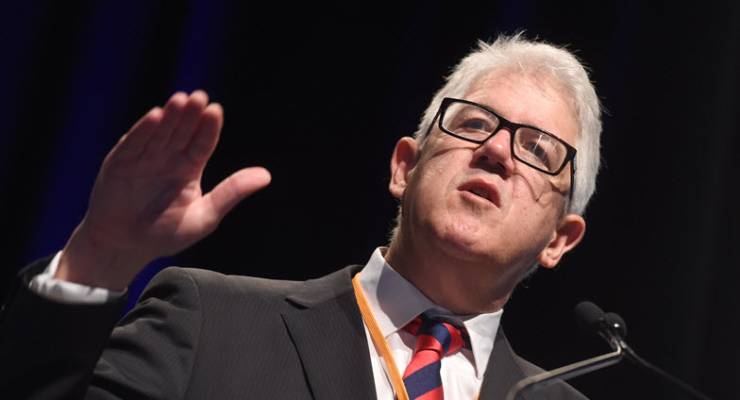
Departing Minerals Council of Australia head Brendan Pearson
They once strode the political landscape as apex predators, capable of determining policy and bringing down Prime Ministers. In the corridors of power, if their word wasn’t law, it made even the most powerful tremble. Now, the two biggest rentseeker lobby groups in Australia, the Business Council and the Minerals Council, are looking like stricken dinosaurs in a world that’s changed too rapidly for them to cope.
Interestingly, BHP, which is in the process of trying to overhaul its badly tattered corporate image, has had a hand in the problems of both.
The Business Council is in disarray: one of its directors, Ian Narev, is mired in the Commonwealth Bank’s money laundering scandal; the Council’s previous chair, Catherine Livingstone, faces serious questions about transparency at that bank; its current chair, Grant King, had to depart the BHP board in the face of investor hostility; its CEO, Jennifer Westacott, was blasted last year by Liberal powerbroker Michael Kroger and told she should leave.
And the Minerals Council has had to deal with an internal revolt by its biggest member, BHP, which has sought to distance itself from the coal-at-all-costs position of now-departed CEO Brendan Pearson, a casualty of BHP’s reluctance to persist with the MCA’s blatant denialism.
In truth, though, neither organisation has been particularly effective of late. The BCA has been pushing for company tax cuts and IR deregulation, unsuccessfully; the MCA has been pushing coal, nuclear power and IR deregulation, unsuccessfully. Every campaign has been conducted in the face of hard facts: there’s no evidence from anywhere in the world that lowering company taxes produces any of the many benefits claimed by the BCA; Australian workers face stagnant wages while disputation is at record lows and productivity is growing; markets have made clear that coal is dead as a new power source in Australia, and the nuclear power industry continues to demonstrate its inability to land projects without multi-hundred per cent cost blowouts and decade-long delays.
The result has been that neither organisation is taken particularly seriously outside the pages of their cheerleader media outlets, the Financial Review and The Australian, and increasingly face criticism within those publications as well. But the entire policy environment in which they operate is now much more heavily contested than it used to be. Whereas once they could rely on dropping dodgy reports to loyal journalists and getting a good run (“Exclusive”!) on the front page of one of the national papers, now they face greater scepticism from journalists. Progressive thinktanks also aggressively use the media to push their own reports and polling that contradict the line run by the business groups. And neither organisation can effectively operate on social media — everything they put out in that space draws volleys of criticism and mockery. Both organisations have also abandoned the pretence of political neutrality to back the Coalition, further reducing their credibility.
The more fundamental problem, perhaps, is that such bodies can’t really operate effectively in public. They operate best in a traditional lobbyist setting — talking directly to ministers, offering their own data, padding the corridors of Parliament House to quietly wield influence. But the more public they are, the more their self-serving claims are targeted, the more their data is rubbished, the sillier they look. The model might have worked fine in the more confined, controllable media environment of a few years ago, back when Crikey was the only outlet likely to challenge dodgy industry reports. Now, there are a range of publications ready to go after them and the mainstream media is keener to factcheck their claims and identify how similar campaigns have been used overseas.
Most of all, the entire environment around economic policy has changed. The neoliberal era, in which making life easier for corporations was the goal even of Labor has been replaced with an era in which beating up on large companies deemed to be in breach of community expectations is not just permissible, but political necessary. The BCA and the MCA were the big beasts of Australian neoliberalism. That era is now over. They must adapt or die.








But if they go, who are Jethro, Turnbo, Abbo, Slomo, Frydo, Nasho, Christo and their canavan of hangers-on going to listen too, when it comes time for policy formation?
The hoarse whisperers
And who is going to give them a cushy high paid job after politics?
I don’t give muc of a crap about BHP but god I hope the Minerals Council dies short brutal death and takes the toxic National party with them
Do you realise how much these Turkeys earn?
There is no way they will shut themselves down.
Adapt or die, preferable that they just die.
When are we going to get a Federal ICAC, and a ban on ministers taking up employment within cooee of their portfolio ever after politics.
Shortly after the Royal Commission into Banking perhaps – or never.
It would be nice if the tiny, warm blooded creatures who feast on their remains are green.
Too dumb to know they are dead describes quite a few segments of the Establishment.